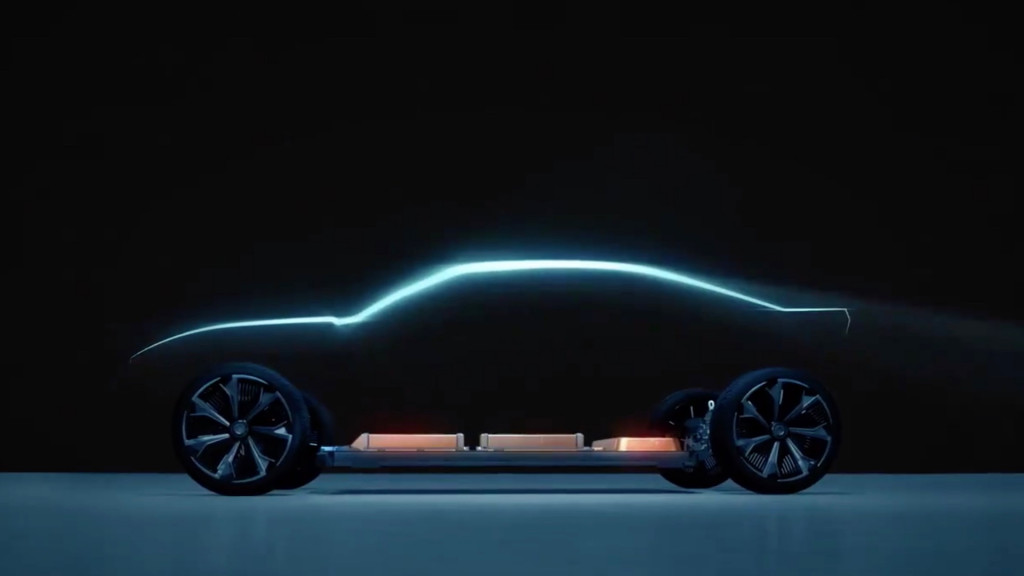GM brought back the Chevrolet Bolt EV this week—as a future affordable EV product peg for the company’s product plan.
While the timeline is yet to be disclosed for the revamped Bolt EV, the timeline for the current Bolt EV disappearing from dealerships remains confirmed.
In April, GM disclosed that it would discontinue the Chevrolet Bolt EV and EUV at the end of 2023, as production winds down at the Orion Assembly plant in Michigan, which GM had already committed to production of the Chevrolet Silverado EV and other large electric trucks on its Ultium platform.
“Drawing on various Ultium and Ultifi technological advancements will help GM bring this popular model back to market on an accelerated timeline,” GM said Wednesday, confirming that the future Bolt EV won’t carry over its existing propulsion tech.
GM Ultium battery – cell stacking
Future Bolt EV won’t be all-new
The automaker also suggested that not everything on the Bolt EV will be new, as it noted that it “will execute it more quickly compared to an all-new program with significantly lower engineering expense and capital investment by updating the vehicle with Ultium and Ultifi technologies and by applying our ‘winning with simplicity’ discipline.”
Ultium is the broad trade term applying to GM battery and electric propulsion families, and Ultifi is the term applying to its EV software, so this simply means that the future Bolt EV won’t carry forward with its present-generation LG Chem cells—which had been the focus of a very costly, large-scale recall that appears to have been worth the effort, leaving customers satisfied and loyal to the brand and nameplate.
GM had no incentive to carry the current Bolt EV’s battery tech forward anyhow. “We’re already on the road to delivering a 60% cost reduction compared to the Bolt EV with the next generation of Ultium,” Barra said in 2021, of tech set to arrive mid-decade, as part of a statement touting the automaker as one of the few to have an EV that’s as affordable as the Bolt family.

Possible electric Chevrolet Camaro in GM Ultium teaser video
Did GM ever actually kill the Chevy Bolt EV?
GM executives had already hinted to Green Car Reports and other outlets that while future electric small cars might be in the works, those wouldn’t use the same large-format Ultium pouch cells that it planned to deploy on everything from the Chevrolet Equinox EV and Blazer EV on up to big trucks like the GMC Hummer EV and Chevy Silverado EV.
Likewise, GM and Honda announced in April 2022 that they were working together on a joint architecture for affordable EVs—one that would use “next-generation Ultium battery technology,” according to GM.
At that time, those compact EVs were set to arrive for 2026. It’s hard to imagine GM working on multiple compact EV platforms outside China, so this week’s announcement likely signals that the project has been pulled ahead—like the automaker managed to accelerate development of the Cadillac Lyriq, perhaps.
GM may have provided some of the answer to what comes next. Earlier this year the company clarified that it might include the flexibility of cylindrical cells in future EVs, as part of its Ultium tech but not as part of the Ultium Cells LLC joint venture. That was made clearer this April with the announcement of a joint venture between GM and Samsung SDI, due to mass-produce cylindrical cells for GM products starting in 2026.
The lower-profile cells would help answer the dimensional challenges that make those large-format cells harder to package within a small car or beneath the floor of a low-profile vehicle.

UAW-made sticker on 2022 Chevy Bolt EV
Bolt EV’s manufacturing dilemma
While the Bolt EV’s Michigan plant shifts to truck production later in the year, the automaker doesn’t have other immediate options for U.S. manufacturing. GM vacated its Lordstown, Ohio, plant that used to assemble compact cars and is located near the Ultium LLC cells facility. It’s now under the ownership of Foxconn, which will likely assemble the $29,900 Fisker Pear urban EV there.
Meanwhile, demand for the Bolt EV surges, and GM will face a gap in its lineup after the end of the year. Of the 36,024 EVs GM delivered in the first half of 2023, just 2,365 were of its new-generation Ultium EVs. The remaining 33,659 were Chevrolet Bolt EVs.
In its update for investors earlier this week, CEO Barra pointed to the Bolt as one of its most in-demand vehicles, at or under a 10-day supply in dealer inventory.
“Actually, we can’t build enough Bolts right now,” said Barra to Wolfe Research analyst Rod Lache.
